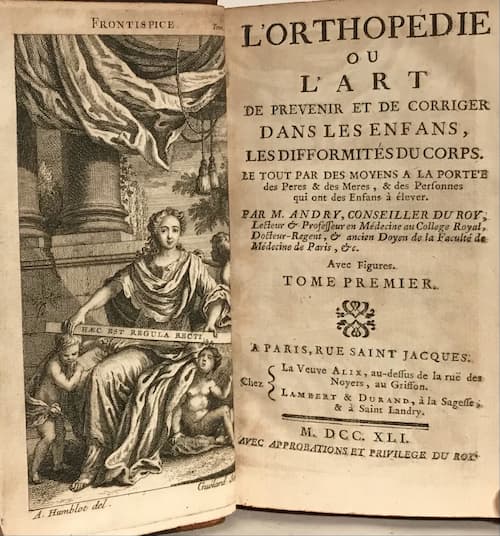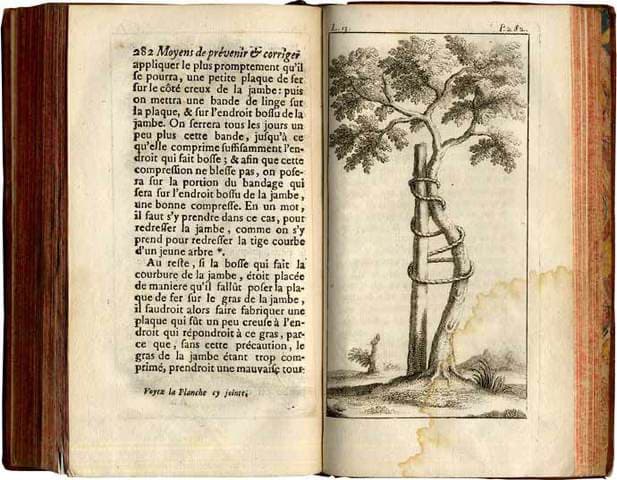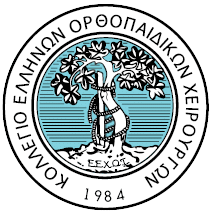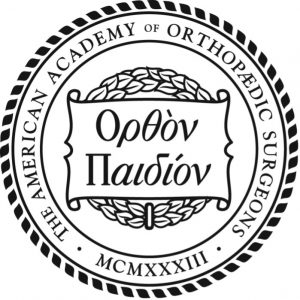Orthopaedic or Orthopedic Surgery (hence the term Orthopaedic or Orthopedic Surgeon) is the medical specialty whose object is the study, prevention and treatment of musculoskeletal diseases. The correct spelling of the word is still a matter of dichotomy in public opinion, often generating heated debate and commentary on social networks. Here we will attempt to shed some light on the case.
Table of contents
Origin of the term Orthopaedics/Orthopaedic Surgeon
The origin of the word Orthopaedics is attributed to the French surgeon from Paris, Nicolas Andry (1658-1742), who coined the term in 1741, borrowing the words "orthos" and "pedion", thus forming the new French word "orthopédie" . The above is explicitly mentioned in the introduction to his book (Traité d'orthopédie ou l'art de prevenir et corriger dans les enfants les difforités du corps, 1741). Therefore, in Greek, the use of the term Orthopaedics or Orthopedics is essentially a reborrowing from French.


Use of the term Orthopedics/Orthopedic Surgeon
The word was erroneously transferred as a counter-loan from French to Greece as "Orthopedics" and "Orthopedic Surgeon". For a long time, the word "Orthopedics" was widely used in books, journals, articles, signs, cards and all kinds of publications. The manuscripts of professors Garofalidis, Simeonidis and Hartofoulidis had the word "Orthopedics" in their title. Both scriptures appear in foreign publications: Campbell's: Operative Orthopaedics (Mosby, New York 1988), Tachdjian: Pediatric Orthopedics (Saunders, USA 1990). The American Academy of Orthopaedic Surgeons (AAOS, or American Academy of Orthopaedic Surgeons), the largest society of Orthopaedic Surgeons in the world (numbers 20 thousand members), has placed on its emblem the words "Orthon Paedion" in Greek characters.


In 1995, after professors from overseas asked the Greek professor Panagiotis Soukakos about the correct spelling of the word, the Hellenic Society of Orthopedic Surgery and Traumatology (HAOST) posed the question to three professors of linguistics (Babiniotis, Petrounias and Christidis). They agreed that historically ae is correct rather than e, but practically both spellings are correct. Following this, the issue was put to a vote at the General Assembly of HAOST, where the word "Orthopaedics" was voted for. The Linguistics Professors' letters are listed ad verbatim below.
Georgios Babiniotis - Professor of Linguistics | University of Athens
- The correct spelling according to the etymology (historical origin) of the word is orthopaedics/orthopaedic surgeon.
- The incorrect writing of the word as orthopedics/orthopedic surgeon for many years creates a situation of habit, but it does not justify or remove the mistake.
- The fact that foreign specialists (if my information is correct) tend to use in international conferences the term with ae (orthopaedics), i.e. the equivalent of the Greek ai, makes things difficult for "Greek scientists", since (writing orthopedics with e) possibly appear to be ignorant of the origin of a word that comes from their own language!
- As is often the case with terms coined by foreigners, in this case the term orthopaedics or orthopedics is misshaped, instead of the correct term paedoorthotics or pedorthotics (similarly to the erroneous term orthodontics, instead of odontorthotics).
Conclusion: The linguistically appropriate terms, in order of preference, are:
- Radical solution: Establishing from here onwards the term pedoorthotic (from the child) or pedorthotic (from the brake). Pedo-orthotics will recall the etymological origin of the term and will fully correspond to the form of the foreign term (orthopaedics) that tends to prevail. Pedorthotics would detach the term from the child and connect it to adults through the brake. In any case, Greek doctors have the right to differentiate themselves from foreigners when they use, even belatedly, what is correct in their language.
- Compromise solution A: Establishment of the etymological spelling orthopaediki/orthopaedikos, which by approaching the spelling that tends to be established (orthopaedics) would remove the suspicion that the "Greek experts ignore what is right or that the word, although Greek, is written in Greek incorrectly! Disadvantage: the restrictive association of the term with only children, not adults, remains.
- Compromise solution B': Retention of the incorrect (but established by long-standing use) spelling orthopedics/orthopedic surgeon. Arguments: a) other Greek words and terms still retain the paretymological spelling (e.g. the building instead of the right building), b) with the generality of the brake, the restrictive use of the term orthopaedics in relation to children is overcome.
In the science of language, as in all human sciences, the possibility of multiple views and interpretations, which ensures its potentiality and freedom, sometimes gives rise to difficulties and dilemmas of choice inherent in the very intellect of man and the language that expresses it.
A. Christidis - Professor of Linguistics | University of Thessaloniki
From a historical point of view, it is certain that the spelling "orthopaedic" is the correct one. After all, there is the explicit statement of the creator of the term Andry that this "neologism" was constructed based on the Greek synthetic ortho- and paed-. This writing is preserved, to a large extent, in the Anglo-Saxon countries (orthopaedics. gynaecology).
The writing "orthopedic" cannot be supported by historical (etymological) arguments. It is clear that "brake" is not involved in the creation of the term. Besides, it is known that the spelling "orthopedie" prevailed in France very early on (for reasons related to the peculiarities of the French language). If this neologism arrived in Greek through French - which is rather certain - then it is explained why the writing "orthopedic" prevailed. From a historical point of view, there is no doubt that the "orthopaedic" rendering is the correct one.
The alternative spelling "orthopedic", although historically unfounded, is based on a long-standing use within a specific professional field. And long-term use – and in the language – legitimizes. In this sense, the writing "orthopedic" is not linguistically unfounded. The preceding observations show the complexity of the issue in its linguistic consideration. Both scriptures "stand" linguistically.
But of course the matter does not end here. The language regulation (in this case the choice between the two scripts for the needs of standardization – homogeneity) imposes decisions. And the decisions are not – nor can they be – “purely” linguistic. Necessarily, any decision will reflect historical perceptions, as they are formed within the various conjunctures. In this particular case, my personal preference leans in favor of the spelling "orthopedic", to the extent that it more faithfully reflects the origin of the term, as a neologism created in the West with specific Greek lexical material. In addition, it aligns the Greek usage with the international one (orthopaedics).
Evangelos Petrounias - Professor of Linguistics | University of Thessaloniki
Regarding your question: Orthopedic or Orthopaedic? The term was coined in French by the doctor professor and medical writer Nicolas Andry de Rois-Regard. Andry coined the term: orthopedie using the lexical elements (today called confixes "symfymata") ortho- & -pedie. These cognates, close to both French and other modern languages, are based on the ancient Greek words: orthos, upright, same, right, "not deformed" and pedias "child rearing".
The original meaning of the term was: "art of correcting or preventing deformities in children". But later the meaning was expanded: "branch of surgery that treats diseases of the motor system". With a similar meaning, the term is also used in other languages, ie in English: "correction or prevention of malformations, especially in the skeletal structure of children." That is, the reference to children always remains.
Regarding writing with e or ae: In French, where the word originated, the ancient Greek ae is usually rendered with e. "As for the Greeks, they didn't borrow the word from the French, they saw it written with an e, and probably for that reason they wrote it with an e. Maybe they didn't guess that etymologically it is based on the ancient Greek word pedea, maybe they didn't want to limit it especially in treating children. That is, the Greek word is between the category of direct loans and the category of "translational loans" (with corresponding: pedic = education).
If it was purely a direct loan it would be: orthopedì? if it was a purely translational loan it would be: orthopaedia. In the other languages of interest in Greece, the writing varies, as sometimes the French writing was followed, and sometimes a closer approach to the ancient Greek root was preferred. In English it is sometimes rendered with e and sometimes with ae: orthopedic – pedic; orthopedics – paedics; orthopedics, -pedy. The writing ae renders the ancient diphthong ai.
In British English they prefer writing with ae, in American English they prefer writing with e. In German it is rendered with a (which can also be written ae): Orthopadie. In Italian they write e: ortopedia in Italian it couldn't be written with ae anyway, because then it would also be read [ae]. If you want the term to be more reminiscent of the ancient Greek root – even though such a scientific discipline did not exist in antiquity, and also to refer to the fact that originally in France the discipline referred specifically to children, then you can suggest changing the spelling to ai.
If you want the term to stay closer to its true source, French, and also not imply that it refers specifically to children, then you can suggest keeping the e, which is more common today.
Conclusion
- The term "Orthopédie" was coined by the French surgeon Nicolas Andry in 1741 and transferred to Greek as a counter-loan, or reborrowing.
- Historically, the term "Orthopaedics" or "Orthopaedic Surgeon" is the correct one, as voted by the General Assembly of HAOST in 1997.
- Neither term is wrong. Both spellings can be used freely. There are Orthopaedists who believe that the spelling Orthopedics expresses them better.
- The issue is not which of the 2 terms is etymologically more correct, or which better represents the subject matter of the specialty.
- The matter is purely historical.
References
- Nicholas Andry (1658-1742), «Traité d’orthopédie ου l’art de prevenir et corriger dans les enfants les difformités du corps», 1741.
- Θεόδωρος Γαροφαλίδης: Ορθοπεδική, Εκδόσεις Παρισιάνος, Αθήναι 1969.
- Γεώργιος Χαρτοφυλακίδης: Επίτομη Ορθοπεδική, Εκδόσεις Παρισιάνος, Αθήνα 1981.
- Παναγιώτης Συμεωνίδης: Ορθοπεδική, University Studio Press, Θεσσαλονίκη 1984.
- Περιοδικό ΕΕΧΟΤ: Ορθοπεδική ή Ορθοπαιδική; Οι απόψεις των καθηγητών γλωσσολογίας. Τεύχος 3, 1996.
FAQs - Frequently Asked Questions
Why is there controversy regarding the correct spelling of the term Orthop(a)edics?
Devotees of the term "Orthopaedics" support the traditional origin from "orthos" & "paedion". Supporters of the spelling "Orthopedics" consider the etymologically more correct origin from "erect" & "brake", as more relevant to the subject of the specialty.
Where does the term Orthopaedics come from historically?
The term “Orthopedie” was coined by the French Surgeon Nicolas Andry in 1741, who borrowed the words “orthos” & “pedion”. The term was then rendered into Greek as a counter-loan.
Which scripture does the Hellenic Association of Orthopaedic Surgery and Traumatology (HAOST) adopt?
The Hellenic Association of Orthopedic Surgery and Traumatology (HAOST) has adopted since 1997 the spelling Orthopaedics, as historically more correct, although it does not condemn the alternative form.
Find us
Book an appointment with us today

